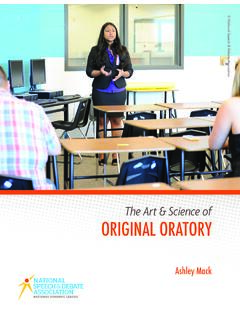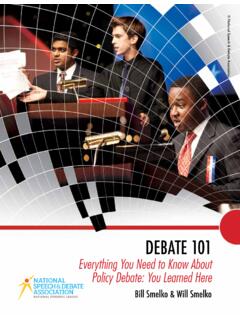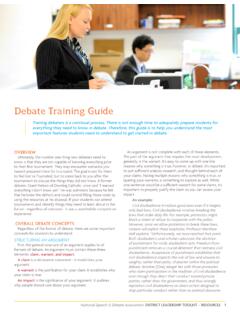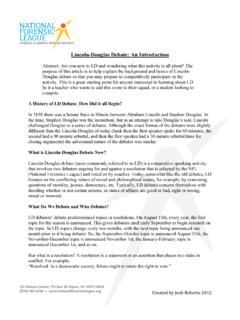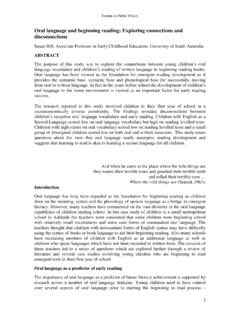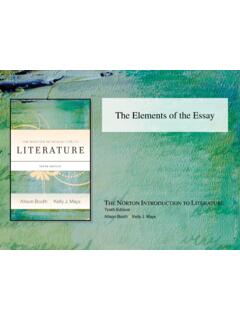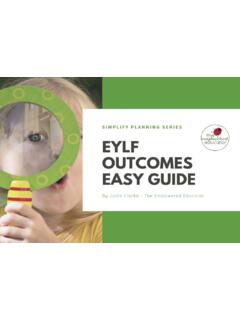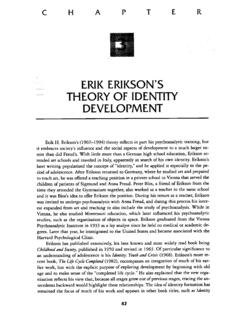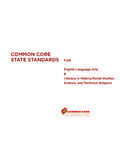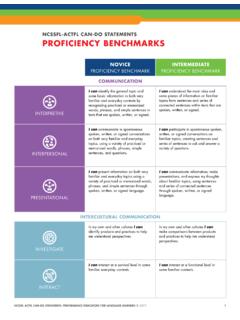Transcription of LINCOLN-DOUGLAS DEBATE
1 LINCOLN-DOUGLAS DEBATEDr. Seth Halvorson & Cherian Koshy National Speech & DEBATE Association NATIONAL SPEECH & DEBATE ASSOCIATIONLINCOLN-DOUGLAS DEBATEDr. Seth Halvorson & Cherian KoshyLINCOLN-DOUGLAS DEBATEC opyright 2013 by the National Speech & DEBATE Association All rights by National Speech & DEBATE Association 125 Watson Street, PO Box 38, Ripon, WI 54971-0038 USAP hone: (920) 748-6206 Fax: (920) 748-9478 part of this publication may be reproduced, stored in a retrieval system, or transmitted in any form or by any means, now known or hereafter invented, including electronic, mechanical, photocopying, recording, scanning, information storage and retrieval, or otherwise, except as permitted under Section 107 or 108 of the 1976 United States Copyright Act, without the prior written permission of the National Speech & DEBATE Association does not discriminate on the basis of race, color, national origin, religion, sex, age, gender identity, gender expression, affectional or sexual orientation, or disability in any of its policies, programs, and and bound in the United States of America NATIONAL SPEECH & DEBATE ASSOCIATIONC ontentsAbout the Authors.
2 IvAbout This Text ..vUnit 1: Introduction to LD DEBATE ..01 Unit 2: How do I write a case? .. 09 Unit 3: During the DEBATE round ..25 Unit 4: Refutation ..33 Unit 5: Rebuttal Speeches .. 43 Unit 6: Go with the flow: taking notes and tracking arguments ..51 Unit 7: Delivery ..55 Unit 8: Sample Affirmative Case ..61 Unit 9: Sample Negative Case .. 69 Unit 10: The DEBATE Round: A Timeline .. 73 Unit 11: Practice suggestions and drills for debaters .. 77 APPENDIX A: Glossary of commonly used DEBATE terminology .. 85 APPENDIX B: Common flowing abbreviations .. 99 APPENDIX C: Case writing exercise .. 101 APPENDIX D: Troubleshooting .. 105iv NATIONAL SPEECH & DEBATE ASSOCIATIONLINCOLN-DOUGLAS DEBATEABOUT THE AUTHORSDR . SETH HALVORSON Ph .D ., Columbia University (NY)CHERIAN KOSHY, National Speech & DEBATE Association; formerly of Apple Valley HS (MN)Dr. Halvorson and Mr. Koshy both debated for Apple Valley High School in Minnesota during the 1990s and were the two Minnesota State Champions from Apple Valley during that decade.
3 Over the course of the last 15 years, both Dr. Halvorson and Mr. Koshy have spent summers traveling the country, teaching students about LINCOLN-DOUGLAS DEBATE . Each summer, they work with hundreds of students who are interested in developing their skills and learning about LD DEBATE . They also coach teams throughout the year, and the students they have coached have been immensely successful on the local, state, regional, and national levels, including impressive finishes at the Tournament of Champions and National Speech & DEBATE Tournament. Over the course of the last 15 years, they have taught thousands of students how to DEBATE , including many current coaches and judges in the activity. In 2006, after spending several summers together, they designed a series of instructional materials they believe will be useful for students, coaches, par-ents, and judges new to the activity of competitive DEBATE .
4 In 2008, the second edition of the text was published including updated material and NATIONAL SPEECH & DEBATE ASSOCIATIONLINCOLN-DOUGLAS DEBATEABOUT THIS TEXTThis text runs in tandem with a number of resources to teach you the ins and outs of LINCOLN-DOUGLAS DEBATE as well as DEBATE generally. We have created a classroom edition of this textbook to use as a modified format for in-class debates as well as a full curriculum to teach various DEBATE forms with assessments, rubrics, lesson plans, and activities. We acknowledge that there is no right way to DEBATE and also that many different styles of de-bate exist. At the same time, we believe that a primer is necessary to provide new students, coach-es, teams, and judges with an understanding of how DEBATE works. We hope that this will serve a starting point for your investigation into the world of DEBATE but that you don t limit yourself to this text.
5 As such, please do not consider this a rulebook for LD DEBATE . Instead, this represents a wide variety of views that encapsulates most community norms about DEBATE from current debat-ers, coaches, and judges. This text is designed for students who are entirely new to the activity and serves as a reference for students with limited competitive DEBATE experience. In future editions and texts, students will learn how to transition to advanced addition, if you are new to the activity, we hope that you will take advantage of the appendix material to start exploring the world of DEBATE . To start your search, we suggest that you contact the National Speech & DEBATE Association ( ), which is the national organization that administers the activity. They can provide you with contact information in your state for DEBATE coaches and tournaments that are happy to answer questions and assist you. Every state in the nation has an NFL district, and in some cases several, so rest assured that wherever you are, you will find opportunities to DEBATE .
6 There is also a state organization that governs high school DEBATE . Try asking your principal if they know how you can start attending tournaments. We would also be happy to help you get started in the activity and can try to put you in touch with someone we know in your area that could help. If you have questions, please email NATIONAL SPEECH & DEBATE ASSOCIATIONLINCOLN-DOUGLAS DEBATEUNIT 1 Introduction to LD DebateWelcome to the wonderful world of DEBATE ! While DEBATE may seem compli-cated and overwhelming at first, try to remember that everyone feels that way when starting any new activity. No one is a naturally gifted football player, or knows the rules of chess when they first sit down at the board. Rest assured that after reading the following pages you will have the tools necessary to succeed at this activity, which we believe is both academically and intellectually rewarding as well as a whole bunch of fun!
7 WHAT IS DEBATE ? DEBATE , and specifically, LINCOLN-DOUGLAS de-bate, commonly referred to as LD, is a com-petitive speaking activity that involves two de-baters arguing for and against a resolution that is selected by the National Speech & DEBATE 02 NATIONAL SPEECH & DEBATE ASSOCIATIONLINCOLN-DOUGLAS DEBATEA ssociation. LD topics change bi-monthly beginning with the September-October topic. Members of the Association vote in advance for the resolutions they would like to DEBATE in the upcoming year. Each resolution is de-fended by one person, the affirmative, and re-jected by another person, the negative. Each debater is responsible for advocating for his or her side of the resolution in front of a judge, who decides which side of the resolution they will vote for based on the arguments present-ed in the DEBATE DOES DEBATE WORK?In each round of competition, one debater is assigned the affirmative position and anoth-er debater is assigned the negative.
8 Through-out the course of any tournament, you can expect to DEBATE both the affirmative and neg-ative many times. In each round, you will be assigned a room, an opponent, and a judge. When you arrive at the room, you will be ex-pected to present a case defending your side of the resolution and to answer arguments made by your opponent. Based on the strength of your arguments, you will be awarded with ei-ther a win or a loss. At some tournaments, the cumulative wins and losses will enable you to participate in elimination rounds such a quar-terfinal, semifinal, and a final round DEBATE . Typically, the tournament champion is deter-mined by the person with the greatest num-ber of wins and fewest losses at a tournament regardless of whether elimination rounds are held. Many tournaments award trophies for the best speakers as well as those who won the most we ve all seen football games and chess matches, we have a reasonable idea of what happens in a match or competition.
9 When it comes to DEBATE , it s a little less clear. The following analog y will clarify everything you need to know about DEBATE and should give you a sense of how to begin preparing for your first any competitive DEBATE situation, the most important concept is forced choice. This means that the judge is required to select be-tween two mutually exclusive propositions. For example, when you re standing in front of a vending machine, you are forced to choose between buying a soda and keeping your dol-lar. You can only choose one of those options; you cannot select both of the options nor can you select neither option. In the same way, all DEBATE resolutions present forced choices to debaters that they must argue. For example, in the resolution, Resolved: civil disobedience in a democracy is morally justified, the affir-mative is required to prove that civil disobedi-ence is the right thing to do while the negative is required to prove that civil disobedience is not the right thing to do.
10 In most circum-stances, you can mentally add the word not into the resolution to get a better idea of what the negative is required to NATIONAL SPEECH & DEBATE ASSOCIATIONLINCOLN-DOUGLAS DEBATEBURDENSNo question of values can be determined entirely true or false. This is why the resolution is debatable. Therefore neither debater should be held to a standard of absolute proof. No debater can realistically be expected to prove complete validity or invalidity of the resolu-tion. The better debater is the one who, on the whole, proves his/her side of the resolution more valid as a general principle. Burden of proof: Each debater has the equal burden to prove the validity of his/her side of the resolution as a general principle. As an LD resolution is a statement of value, there is no presumption towards either side. Burden of clash: Each debater has an equal burden to clash with his/her opponent s position.


